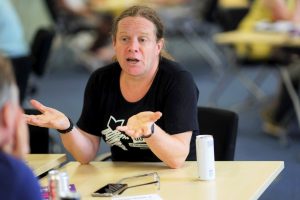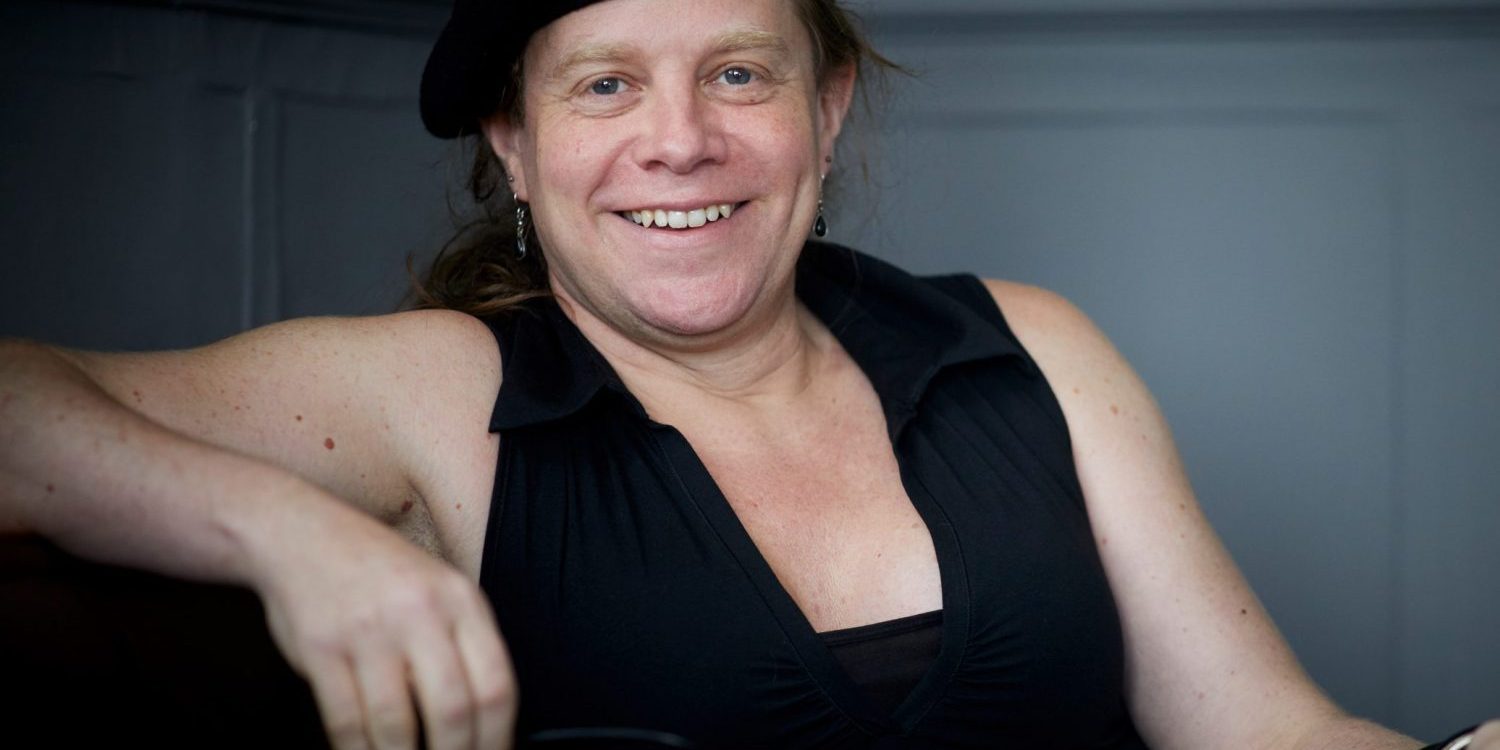We all need to unjudge
Recently the Human Library celebrated its 20th anniversary. Twenty years of challenging stereotypes through personal conversations in over 80 countries around the world. A cause for celebration, but also a moment to put those who help make it possible in the spotlight! This series aims to do just that, as we talk with our local book depot managers about the work they do.
Passion for Conversation

Katy at a reading in a workplace.
Katy Jon Went is a depot manager, however, she is also much more than that. As coordinator of the Human Library in the UK, Katy recruits and trains books, librarians, and depot managers, while also organizing and hosting events – both on location and online. She plays an important role within the organization, and she loves it: “I get to be in the best job on the planet – helping to create conversation with wonderful diverse, different and varied people who otherwise might not have a voice, and might be ignored by the majority”.
As she talks about her personal and professional life experiences, it becomes clear that she has a passion for conversation. For example, she has been doing diversity trainings for a long time, mainly focusing on LGBTQ+, mental health and faith. She has also spent fifteen years running a tech company, worked in PR, recently joined the board of a Canadian start-up, is part of a local theatre board, on diversity councils for her county and national media, and regularly moderates panels, among other activities.
All of these experiences taught her valuable lessons which relate to the concept of the Human Library and its focus on respectful conversations: “you don’t get permission to talk to someone unless you listen first,” Katy says, “even when it was Christian work, it was always about winning the right to talk to someone. And you won that right by respect and listening to them first.”
Talking to strangers
Katy first got involved with the Human Library twelve years ago. A few months after attending an event as a reader, she decided that she wanted to publish as a book herself. In the past dozen years, she has published under the titles of ‘ex-missionary’, ‘transgender, ‘bipolar’ and ‘non-binary’. About the various titles she explains that “labels do not necessarily define us, but they do start the conversation at the Human Library. I have described labels at the Human Library as clickbait – but in a positive way. They are like the negative headline, where the rest of the article is actually really positive about the human experience.”
After being a book for eight years, she was asked if she wanted to become more involved in the work of the UK library and she jumped at the opportunity. She loves her job and is very good at it, but it is not always easy. “Despite appearing to be very confident and sociable, I am also riddled with anxiety and panic attacks, but once I get past the initial fear, I actually love meeting strangers. Some of the best things that have happened in my life have come from talking to strangers”, she explains.
A growing community
The Human Library has grown continuously over the years. The number of volunteer books and librarians are increasing each week and to exemplify the UK developments, four years ago the library hosted 15 events in the UK, this doubled to 33 the next year and doubled again to 69 events the year before Covid.

Katy as our online librarian on Zoom.
Furthermore, the Human Library’s approach and core methodology has not really changed over the years. It was created ahead of its time and took time to develop book depots with a proper strategy to ensure sustainability and embedding with the local community.
“It is about a person having insight into your life for thirty minutes, about exchanging experiences. It is not just giving them an autobiography. They can go buy a real book for that. One difference between a printed book and a human book is that you can stop and start the human book. You can interact with the author; you can go outside the pages.”
This is where she sees the power of the Human Library and its ability to create personal change:
“We are not going to fight the system, we are trying to fight human nature,” she says, “we are just creating an environment to see what happens when two humans meet. It is like a chemical experiment every single time.”
However, the community each book depot creates is also a source of change, Katy thinks:
“The books themselves end up breaking their own taboos or fears of each other,” she says, “they are a modelling community to the rest of the world. If our black book and police book can get on together, if our feminist and trans books can get on together, if our evangelical and gay books can get on together… then it proves that we all can.”
Unjudgement: a challenge for everyone
Katy had to learn to unjudge her readers as well – learning that readers can surprise you and meaningful conversations can be had even with those who seem to be against you. We all have judgements:
“At the end of the day the rest of the world sees us as something else before it sees us as humans. So even if we see ourselves as human, the world sees us first as trans, black or disabled. But if the world sees me first as those things, it is probably also how I see others. It is about recognizing the other aspects of being human: we are imperfect, we make mistakes, we do make judgements and we have unconscious biases.”
One of the biggest lessons Katy learned in the Human Library is that unjudgement is “a challenge to everyone in the human library. It is a challenge to staff, a challenge of librarians to books, books to librarians and other books, and to all of us and our readers and our readers to us. It works on every single level.”





